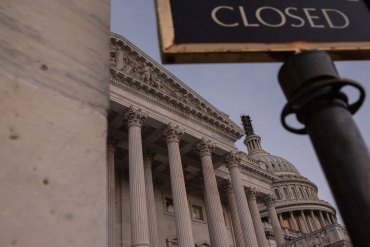Effective but Underprescribed: HIV Prevention Meds Aren’t Reaching Enough People
PrEP has been available for more than a decade, but billing mistakes, lack of awareness, and lingering stigma keep many people from getting the lifesaving HIV prevention medication.
Listen: Many Tents Are Gone, but Washington’s Homeless — And Their Health Problems — Aren’t
Sweeps of encampments scatter homeless people, as medications are tossed and street medicine providers scramble to reconnect with their patients. KFF Health News senior correspondent Angela Hart discusses the aftermath on the Jan. 28 edition of WAMU’s “Health Hub.”
If You’re Pregnant and Uninsured, Medicaid Might Be Your Answer
Prenatal care can make a huge difference to the long-term health of both the parent and baby. Every state offers health coverage to lower-income pregnant women who might otherwise go uninsured.
NIH Grant Disruptions Slow Down Breast Cancer Research
The Trump administration has made the future of federal funding for cancer research uncertain. At one groundbreaking breast cancer research lab, work that could save lives has slowed significantly.
Farmers Now Owe a Lot More for Health Insurance
More than a quarter of the agricultural workforce purchases health insurance through the individual marketplace, a much larger share than the overall percentage of U.S. adults. After a tough year for farmers, the loss of enhanced ACA subsidies is putting health insurance out of reach for many.
How Is Your County Spending Opioid Settlement Cash? Our New Tool Follows the Money.
Lifesaving or wasteful? Opinion is divided on the ways local communities are using opioid settlement funds. Survivors of the overdose crisis and families who’ve lost loved ones to it are raising alarms about what some perceive as wasteful spending.
An estimated 4.8 million people are expected to go without health coverage because Congress did not extend enhanced subsidies for Affordable Care Act plans. But even without a health plan, people will need medical care in 2026. Many of them have been thinking through their plan B to maintain their health.
Homeless Shelters for Seniors Pop Up, Catering to Older Adults’ Medical Needs
Seniors are the fastest-growing segment of homeless Americans. Shelters are struggling to take in people with mobility issues and other chronic health conditions that can make living in a shelter nearly impossible. But specialized shelters for seniors are cropping up around the country to fill the gap.
To Knock Down Health-System Hurdles Between You and HIV Prevention, Try These 6 Things
It’s been more than 10 years since the FDA first approved an HIV prevention drug. Today, people who could benefit from preexposure prophylaxis often struggle to access the lifesaving medicine or run into doctors without the education or empathy to offer affirming care. And those lapses can produce billing headaches.
It’s the ‘Gold Standard’ in Autism Care. Why Are States Reining It In?
States facing yawning budget shortfalls have begun cutting Medicaid reimbursements for a wide variety of services. In some states, dramatic cuts are targeting therapies that many families of autistic people say are essential to caring for their loved ones.
Criminally Ill: Systemic Failures Turn State Mental Hospitals Into Prisons
There has been a steep rise in the share of people with severe mental illnesses being sent to state psychiatric hospitals on court orders after being accused of serious crimes. The shift has all but halted patients’ ability to get care before they have a catastrophic crisis.
Trump Rules Force Cancer Registries To ‘Erase’ Trans Patients From Public Health Data
In 2026, U.S. cancer registries that receive federal funding will be required by the Trump administration to classify patients’ sex as only male, female, or not stated/unknown.
This HIV Expert Refused To Censor Data, Then Quit the CDC
HIV physician John Weiser talks about why complying with President Donald Trump’s orders to erase transgender people is bad for science and society. And he notes that acquiescing didn’t spare the CDC from further harm.
Listen: Nation’s Capital Cuts Traffic Deaths as Rates Rise Across US
National traffic deaths are higher than they were a decade ago, despite safety initiatives at the local, state, and federal levels. But recently that trajectory has changed in Washington, D.C., itself.
Listen: New Federal Guidelines Could Weaken Consumer Protections Against Medical Debt
The Trump administration has taken another step to weaken protections for Americans with medical debt, issuing rules that undercut state efforts to keep these debts off consumers’ credit reports.
So Your Insurance Dropped Your Doctor. Now What?
Patients sometimes find themselves scrambling for affordable care when a contract dispute causes a hospital — and most of the doctors and other clinicians who work there — to be dropped from an insurance network. Here are six things to know if that happens to you.
As Sports Betting Explodes, States Try To Set Limits To Stop Gambling Addiction
Some advocates and lawmakers want to impose national regulations on the gambling industry but would settle for reining in excessive betting at the state level.
Listen: Amid Shutdown Stalemate, Families Brace for SNAP Cuts and Paycheck Limbo
KFF Health News chief Washington correspondent Julie Rovner appeared on WAMU’s “Health Hub” to discuss how the government shutdown is affecting food benefits and the help many Americans get to offset their health insurance premiums.
‘Cancer Doesn’t Care’: Citizen Lobbyists Unite To Push Past Washington’s Ugly Politics
Despite a poisonous political climate, hundreds of volunteer advocates put partisan differences aside and pressed Congress to help people with cancer.
Listen: Green Goodbyes: Choosing an Eco-Friendly Burial
Environmental and economic concerns prompt some people to explore obsequies options beyond metal caskets and cremation.


























